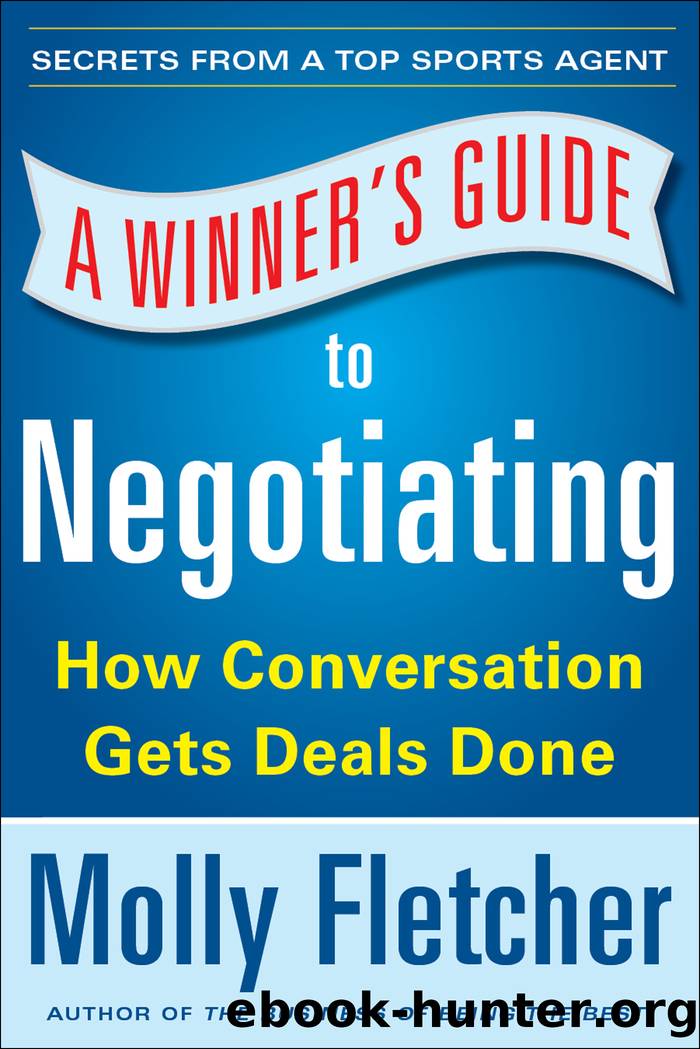A Winner's Guide to Negotiating by Molly Fletcher

Author:Molly Fletcher
Language: eng
Format: epub
Publisher: McGraw Hill LLC
Published: 2015-10-15T00:00:00+00:00
WHAT THE PAUSE ACCOMPLISHES
The pause may be only as long as a breath, or it can be any length of time before the next communication. Most of us feel uncomfortable with dead zones in conversation. A conversationâand thatâs what a negotiation boils down toâis like a tightrope stretched between two people. Silence makes you look around for the net, some sort of signal that we are still in communication and nothing has gone wrong.
We donât like ambiguity. Itâs a big vacuum, and we try to fill it. In a conversation or negotiation, silence can signal ambiguity.
In that discomfort, we seek to fill the space with small talkâanything that can make us feel that we are still in a safe place with the other person. Some professions take full advantage of the human need to break for a pause. Two groups of people who will never interrupt you and will always expect you to fill the silence are attorneys and the media. Attorneys get paid by the hour, so the more you talk, the more they make. The reporters and journalists who have crossed my path know that the more information they have, the better the story. The more their source speaks, the greater the chance is of that person saying something noteworthy or even sensational.
Both lawyers and the media are criticized heavily in our culture, but thatâs a tribute to their ability to use what we say to their greatest benefit. They have mastered the art of quiet, and in that space they give us every chance to help them. We can learn from them to be better negotiators by Embracing the Pause the way they do.
To illustrate the power of the pause in the extreme case, I think most of us have experienced that grace of closeness with those who are closest to us. We do not fear the silence of intimacy because we know one another so well that this level of silence is safe. We have this understanding of silence whenever we rock a child to sleep or spend time with someone who is injured and cannot speak. In everyday life, with people we donât know as well, we are right to fear the pause because we associate silence with uncertainty.
I see this with my daughters. Like most kids, they would rather play than clean their rooms.
âIt needs to be spotless before we leave for church,â I tell them.
âBut Mom,â they reply, and whatever they say next is just more blah, blah, blah to me.
They keep talking. I stay quiet.
I pause. I stare at them. Iâm telegraphing to them that this isnât a six-minute mile Iâm asking for, but if they donât get their behinds up the stairs in a minute, they will be running laps around the house.
They donât hear that. They donât hear anything. They just know that when Iâm quiet, they have reason to fear. I stand my ground, and it doesnât take long for them to finally end their excuses because theyâre not getting anywhere and theyâve started to get in touch with the fear wrapped in my silence.
Download
This site does not store any files on its server. We only index and link to content provided by other sites. Please contact the content providers to delete copyright contents if any and email us, we'll remove relevant links or contents immediately.
| Business School Guides | GMAT |
| Guides | Interviewing |
| Job Hunting | Job Markets & Advice |
| Resumes | Vocational Guidance |
| Volunteer Work |
The Motivation Myth by Jeff Haden(5191)
Audition by Ryu Murakami(4910)
Adulting by Kelly Williams Brown(4552)
The Confidence Code by Katty Kay(4237)
A Mind For Numbers: How to Excel at Math and Science (Even If You Flunked Algebra) by Barbara Oakley(3287)
Waiting in the Wings by Melissa Brayden(3205)
Self-Esteem by Matthew McKay & Patrick Fanning(3125)
Fooled by Randomness: The Hidden Role of Chance in Life and in the Markets by Nassim Nicholas Taleb(3091)
The ONE Thing by Gary Keller(3051)
Nice Girls Don't Get the Corner Office by Lois P. Frankel(3034)
The Dictionary of Body Language by Joe Navarro(2983)
How to be More Interesting by Edward De Bono(2778)
Designing Your Life by Bill Burnett(2720)
Getting Things Done by David Allen(2683)
The Plant Paradox by Dr. Steven R. Gundry M.D(2596)
Police Exams Prep 2018-2019 by Kaplan Test Prep(2527)
What Color Is Your Parachute? 2015 by Richard N. Bolles(2295)
Dangerous Personalities by Joe Navarro(2273)
When to Jump by Mike Lewis(2234)
